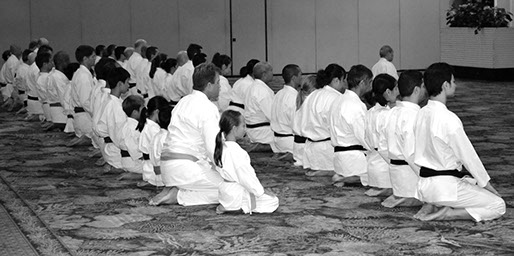Japanese Words used in Karate
Dojo Kun
JKA Karate teaches a student to be peaceful. Our dojo kun reminds us to:
1. Seek Perfection of Character
![]()
1. Be Faithful
![]()
1. Endeavor
![]()
1. Respect Others
![]()
1. Refrain from Violent Behavior
![]()
 All of which are numbered 1 and are given the same value. A JKA Karateka does not boast showy demonstrations nor the points earned in tournaments. A JKA Karateka has kime (focus) and constantly learns about the harmony between the mind and body. A true Karateka does not engage in fights or brawls but if conflict is unavoidable, JKA Karate dictates taking down an opponent with a single blow.
All of which are numbered 1 and are given the same value. A JKA Karateka does not boast showy demonstrations nor the points earned in tournaments. A JKA Karateka has kime (focus) and constantly learns about the harmony between the mind and body. A true Karateka does not engage in fights or brawls but if conflict is unavoidable, JKA Karate dictates taking down an opponent with a single blow.
Because of strong roots and foundations, JKA Masters base every lesson technique in solid, scientific physical movement and theory. Experience allowed them to refine and improve every single detail that mattered in the improvement of techniques. There are also many Japanese words used in Karate. Below is a list of the most common terms used during class in JKA Hawaii.
General Terms
Karate
Empty Hand
Sensei
Teacher
Senpai
Senior
Do-Gi/Gi
Uniform
Dojo
Practice Area
Osu/Oss
(Various Meanings)
Seiza
Kneel
Mokoso
Meditate
Mokoso-Yame
End Meditation
Shomani
Ancestors
Rei
Bow
Otagai Ni Rei
Bow to Others
Kihon
Basics
Kumite
Sparing
Kata
Form
Hajime
Begin
Yame
Stop
Hai
Yes
Positions
Yoi
Natural Stance
Matte
Wait
Mawatte
Turn Around
Gedan
Lower
Gedan-barai
Lower Sweeping Block
Jodan
Upper
Jodan-uke
Upper Level Block
Chudan
Mid-Level
Chudan-soto-uke
Mid-Level Outside Block
Mae-geri
Front Kick
Mawashi-geri
Round-house Kick
Yoko-geri
Side Kick
Yoko-geri Kekomi
Side Thrust Kick
Kiba-dachi
Horse Riding Stance
Kamae
Fighting Posture
Kokutsu-dachi
Back Stance
Kiai
Battle Shout
Other
Ichi
1
Ni
2
San
3
Shi
4
Go
5
Roku
6
Shichi
7
Hachi
8
Kyu
9
Ju
10
Hitotsu
1
Koto
Thing/Matter
Jinkaku Kansei ni Tsutomuru Koto
Seek Perfection of Character
Makoto no michi o mamoru koto
Be Faithful
Doryoku no seishin o yashinau koto
Endevour
Reigi o omonnzuru koto
Respect others
Kekki no yu o imashimuru koto
Refrain from Violent Behavior

